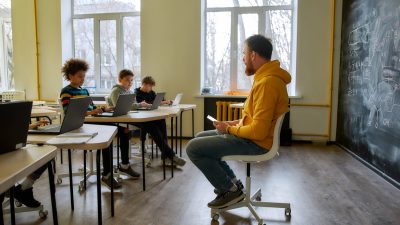How the Education-Tech Industry Is Trying to Profit from COVID-19

The COVID-19 pandemic has closed school districts across the United States, introducing a new conversation about what schools and teachers actually do and, frankly, whether or not they are necessary at all.
On the Internet and in real life, teachers, parents, writers, and entrepreneurs have been forced to grapple with this new reality. Students from preschool to college are also now having to separate learning from the physical, in-person, brick-and-mortar concept of school.
“Parents are struggling to cope as coronavirus worries shut schools down,” a recent Business Insider article warned. Children, too, are feeling upset and alone, with the sudden loss of structure and community—not to mention the confusion that’s washed over students who just days ago were busily planning for college, graduation, playoffs, or prom.
The closures are occurring alongside the collective realization that public schools have become absolutely essential safety nets for students and families who, without them, can’t access enough food, childcare, or educational technology.
Schools in Minnesota, like many other states, were shuttered last week, seemingly overnight. My own children attend the Minneapolis Public Schools, and it wasn’t long before a phone call went out to families, letting them know that meals, school supplies, learning packets, and pantry staples will be available at school sites across the city.
But here’s another concern: What if this sudden disruption is actually a golden opportunity for those invested in market-based education reform?
Could this be the moment many well-heeled investors and politicians, from Netflix CEO Reed Hastings to Secretary of Education Betsy DeVos, have hoped for, when public education becomes less democratic and more individualized?
After Hurricane Katrina ravaged New Orleans in 2004, the city’s school system received a makeover, courtesy of market-based education reform entities such as Teach for America and the Bill and Melinda Gates Foundation.
Today, there are no traditional public schools left in New Orleans. Instead, the city is a patchwork of privately run charter schools, along with the swath of private schools that have long drawn the city’s wealthiest, and whitest, students.
Many observers, including parents of color who did not appreciate the overhauling of their city’s schools, have documented the way a crisis—Hurricane Katrina—was used to usher in a new era of disaster capitalism for New Orleans.
The push to privatize education in New Orleans, post-Katrina, can also be tiedto similar efforts in Puerto Rico, following the destruction of Hurricane Maria.
Now, some observers are predicting that the COVID-19 crisis will provide yet another disaster capitalism-style intervention in America’s public schools. Audrey Watters, a critic of the influence of capitalism and technology in education, tackled this subject in a March 8 blog post.
Watters lives in Seattle, the epicenter of both tech-based innovation and the spread of the coronavirus in the United States. When Washington Governor Jay Inslee closed schools, Watters noted that many “ed-tech” enthusiasts were likely “giddily sharing lists of their favorite digital learning tools,” with little thought given to “questions of accessibility, privacy, or security.”
Something akin to a gold rush could be upon us. Suddenly, a crisis has caused schools to close. But learning must go on. But how? Ed-tech financiers and product manufacturers have the answers!
The educational technology industry already rakes in billions of dollars each year. Even before the pandemic, ed-tech was quickly becoming a “global phenomenon,” with the potential for expansion seen in any software or app that would, allegedly, make teachers’ lives easier.
It is extreme, of course, to imagine that the end goal of ed-tech is to replace all teachers with computers. However, one of the key arguments made by industry insiders is that technology can help educators handle larger class sizes.
Struggling with teacher shortages or overcrowded classrooms? Consider giving kids Chromebooks, advises EdTech magazine.
Want to cut costs? Put one teacher—or an assistant—in charge of fifty or so students, seated in front of their own screens, moving through pre-packaged curriculum one personalized step at a time.
Better yet, just keep kids at home. Let them attend virtual schools or plow through lessons without a teacher on hand.
For ed-tech’s innovators, COVID-19 is an opportunity to experiment with tech-driven, less labor-intensive schooling options. But, as Watters points out, education is much more than the simple delivery of instruction or the mastery of certain skills.
Instead, schools serve as community hubs and nutrition centers, as well as safe spaces for students and families left reeling by inequality, housing instability, and the general insecurity that many live with today.
“To close the doors to a school,” Watters writes, “shifts the burden of all these services onto individual families.” And, it may allow entrepreneurs another Katrina-like window of opportunity to reconfigure schools to their liking.
*
Note to readers: please click the share buttons above or below. Forward this article to your email lists. Crosspost on your blog site, internet forums. etc.
Sarah Lahm is a Minneapolis-based writer and researcher. Her work has appeared in outlets such as The Progressive, where she writes the Midwest Dispatch column and contributes pieces to the Public School Shakedown site.
Featured image is from BAZA Productions, courtesy of ShutterStock

